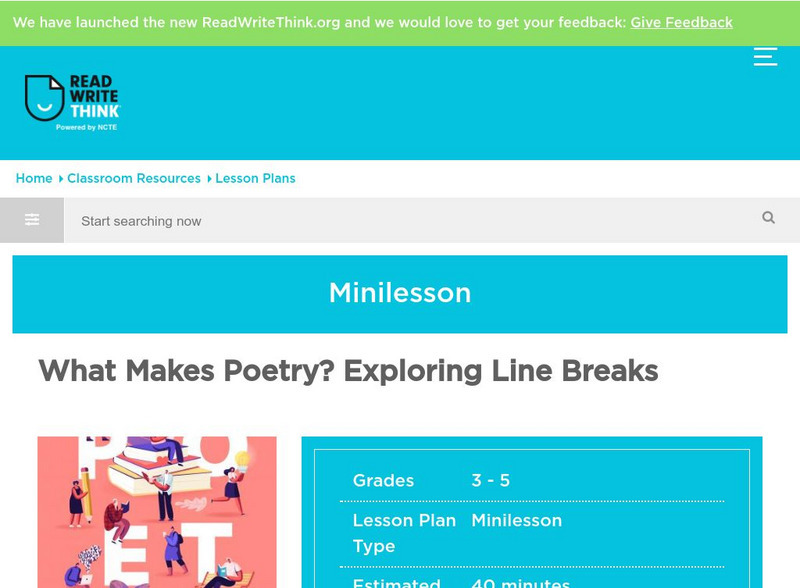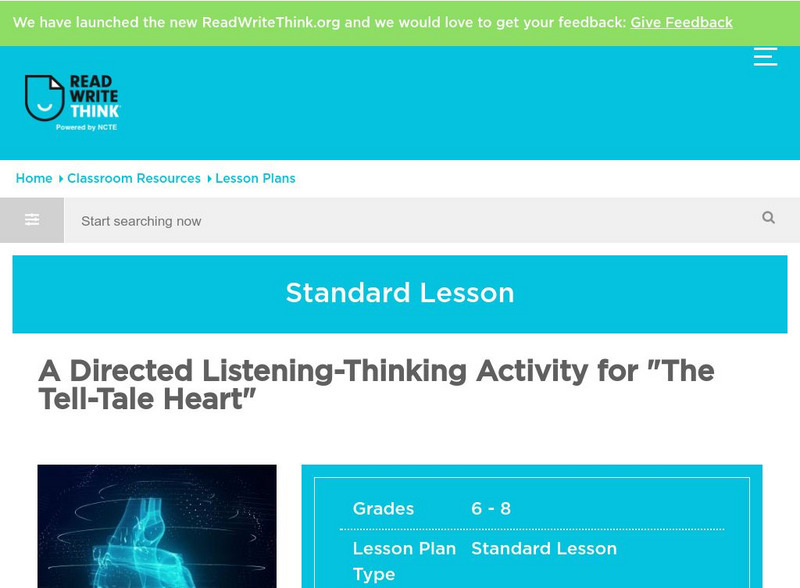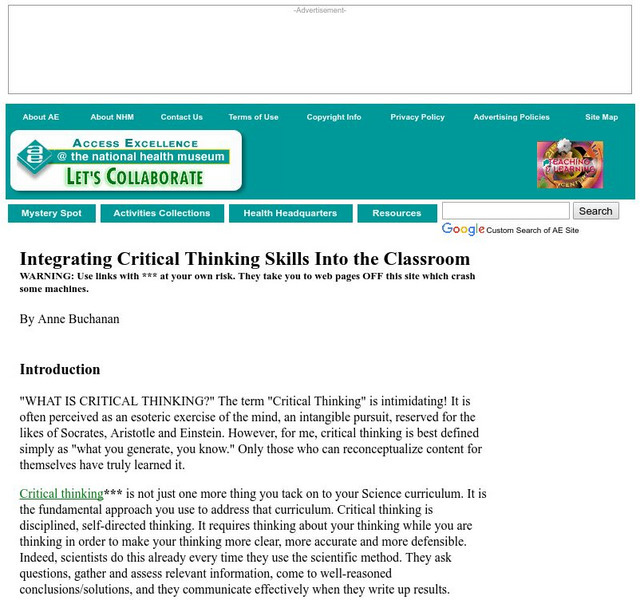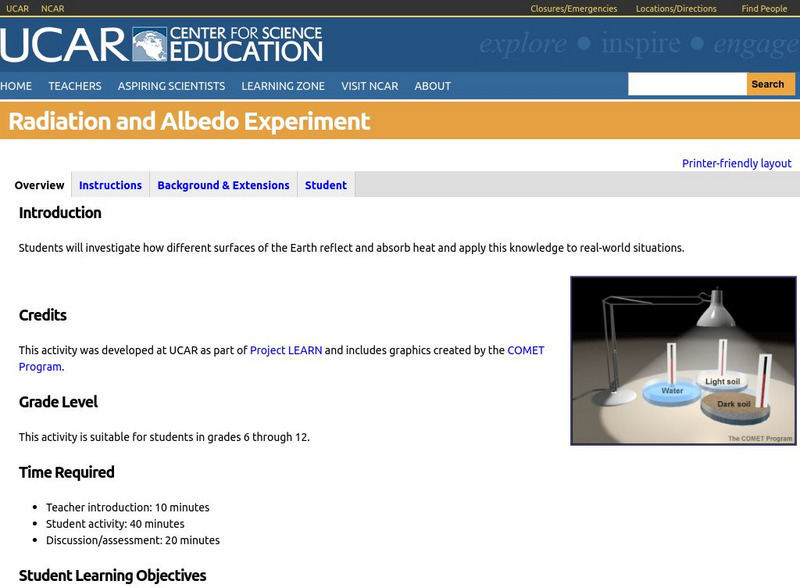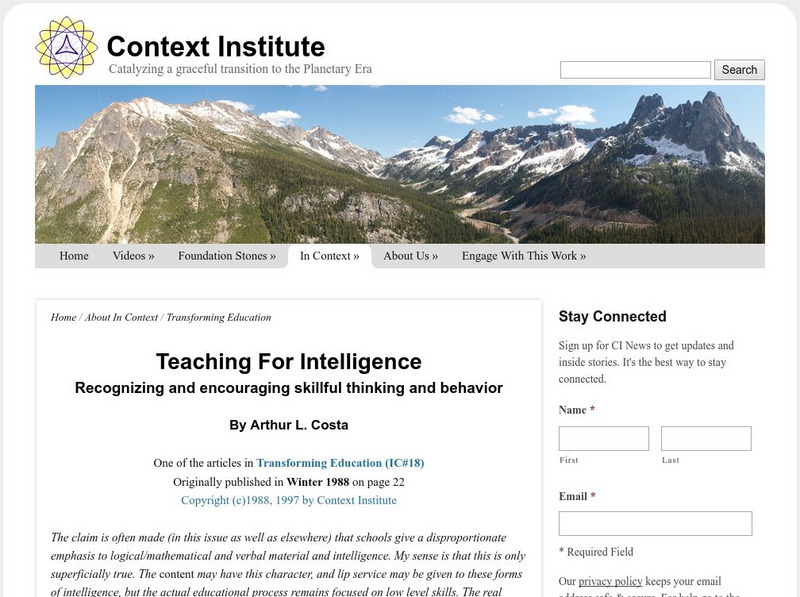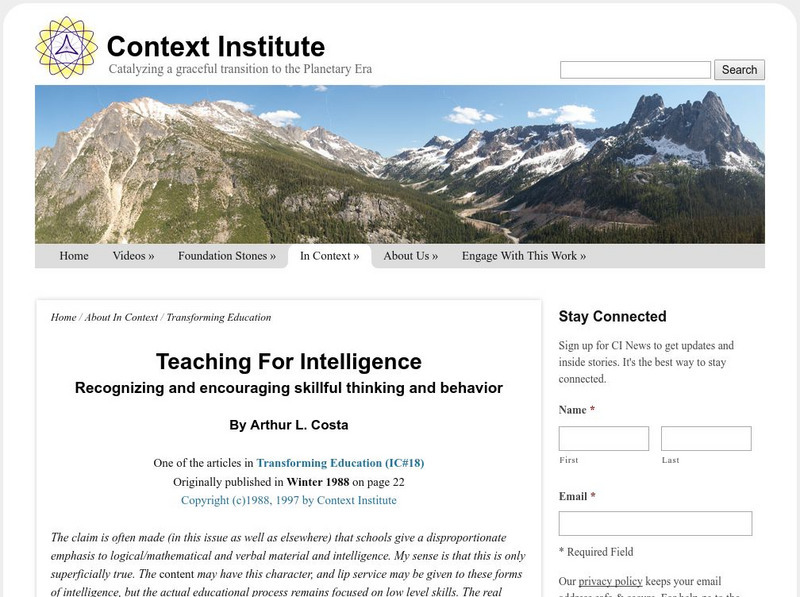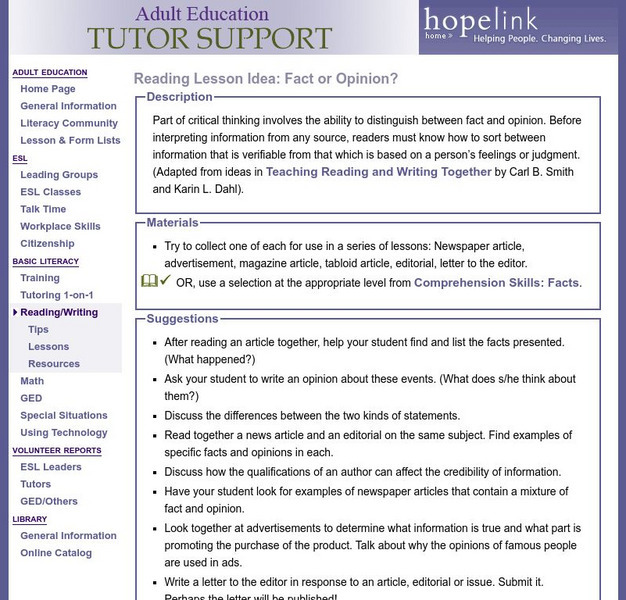Hi, what do you want to do?
ReadWriteThink
Read Write Think: What Makes Poetry? Exploring Line Breaks
This lesson plan explains how analyzing poetry is a many-layered process. This lesson plan introduces the special characteristics of poetry and leads students through a look at how poems are structured and why. Includes links to poems...
ReadWriteThink
Read Write Think: It Doesn't Have to End That Way
Literary response and prediction are the focus of this lesson plan. Knowing story structure is an important skill for literary analysis, and this gives teachers a way to help young scholars develop this skill. Includes links to web...
ReadWriteThink
Read Write Think: A Directed Listening Thinking Activity
Lesson which requires students to listen to The Tell-Tale Heart read aloud, answer prediction questions during the reading, and write written responses after. Excellent for beginning a mystery unit.
ReadWriteThink
Read Write Think: Seuss and Silverstein: Posing Questions, Presenting Points
Contains plans for four lessons that ask students to formulate critical thinking questions and lead class discussions about the issues raised in the books of Dr. Seuss and Shel Silverstein. In addition to objectives and standards, this...
Other
Exploring Computer Science: Computational Thinking for Everyone
The head of the Computer Science Department at Carnegie Mellon University, Jeannette M. Wing, presents her vision that computational thinking will be a fundamental skill used by everyone in the world by the middle of the 21st Century.
Other
Harvard Business School: The Path to Critical Thinking by Stever Robbins
An article written by Stever Robbins discussing how to become a critical thinker. This is written from a business perspective but the ideas can easily be applied to education.
PBS
Pbs News Hour: Responding to Quotes and Aphorisms
The objective of this lesson plan is to teach students about responding to quotes and aphorisms. This site features a lesson plan with detailed information.
Other
The Futures Channel: Proportional Reasoning
"Connecting learning to the real world" is the goal of the Futures Channel. Through the use of short videos, teachers can integrate real-world examples of how math and science are used in everyday life. Complete teaching guidelines...
National Health Museum
Access Excellence: Integrating Critical Thinking Skills
This site from Access Excellence explores how, as an educator, you can incorporate critical thinking skills into the classroom. Content focuses on how to cover content so that students can grasp information, engage with the teacher, read...
National Health Museum
Access Excellence: In Search of Real Science
The author of this paper discusses some of the challenges and problems encountered when teaching science and the scientific method to students. He provides links for some sample lessons. Site by Access Excellence.
University Corporation for Atmospheric Research
Ucar: Just a Phase: Water as a Solid, Liquid, and Gas
This site helps students construct a model of the arrangement of water molecules when present as solid, liquid or gas. Includes background information, lesson plans, links to standards and assessment ideas.
Other
Univ. Of Mississippi: Critical Approaches to Literature
Here are nine common critical approaches to the study of literature based on X.J. Kennedy and Dana Gioia's Literature: An Introductionto Fiction, Poetry, and Drama.
Smithsonian Institution
National Museum of American History: You Be the Historian
Exercise involves learners in figuring out what life was like two hundred years ago for the colonial American Springer family by examining objects and documents they left behind.
University Corporation for Atmospheric Research
Ucar: Atmospheric Processes Radiation
This site provides background information, images, and an activity to help students understand the concept of radiation. Includes both the student pages and a teachers guide with lesson plan.
Other
Teaching for Intelligence: Recognizing and Encouraging Skillful Thinking
Teaching students how to think is an important task for any educator. This well written and informative article lists 12 characteristics of intelligent behaviors that can help you understand how to teach skillful thinking to your students.
Other
Teaching for Intelligence: Recognizing and Encouraging Skillful Thinking
Teaching students how to think is an important task for any educator. This well written and informative article lists 12 characteristics of intelligent behaviors that can help you understand how to teach skillful thinking to your students.
Daily Teaching Tools
Daily Teaching Tools: Decisions and Goals
This Daily Teaching Tools resource provides a graphic organizer that will help students with goal setting. This graphic organizer with also help with understanding controversies, solving dilemmas, and making decisions.
ReadWriteThink
Read Write Think: Book Sorting: Using Observation and Comprehension
Critical thinking, comprehension and analysis skills are the focus of this physical activity. Good beginning to teaching different ways of looking at things.
Hopelink
Hopelink: Reading Lesson Idea: Fact or Opinion?
In this lesson, learners must learn to recognize the differences between fact and opinion.
iCivics
I Civics: Games: Argument Wars
Games in which players act as lawyers arguing head to head before a judge about real Supreme Court cases.
University of Illinois
University of Illinois Extension: Character Education "I Am Me"
Excellent resource for empowering students to become better learners. This lesson includes promoting students' understanding of themselves through self-expression, critical thinking skills, and creative writing and thinking skills...
University of Illinois
University of Illinois Extension: Is It What I Think or What I Know? (Fact or Opinion)
This short lesson provides a fairly simple way to teach young young scholars the difference between fact and opinion.
University of Illinois
University of Illinois Extension: Character Education "Decisions!"
Excellent resource for empowering students to become better learners. This lesson includes helping students develop decision-making skills, promote critical thinking skills, and reflect on their beliefs. Good site.
University of Illinois
University of Illinois Extension: Character Education "I Would Invent"
Excellent resource for empowering young scholars to become better learners. This lesson includes encouraging students to develop an interest in science, to promote critical thinking skills, and to enhance reading and writing skills.





